
How to Turn Off or Disable Google Smart Lock (Android & Chrome) - 2026 Guide
Dec 31, 2025 • Filed to: Screen Lock Removal • Proven solutions
Enhance your Android security and streamline access with Google Smart Lock, a powerful feature from Google designed to safeguard your data while ensuring effortless device use. Whether for troubleshooting, performance issues, or personal preferences, you can easily learn how to remove Google Smart Lock to customize your device experience.
This guide explains its key benefits and provides practical steps to manage or disable it.
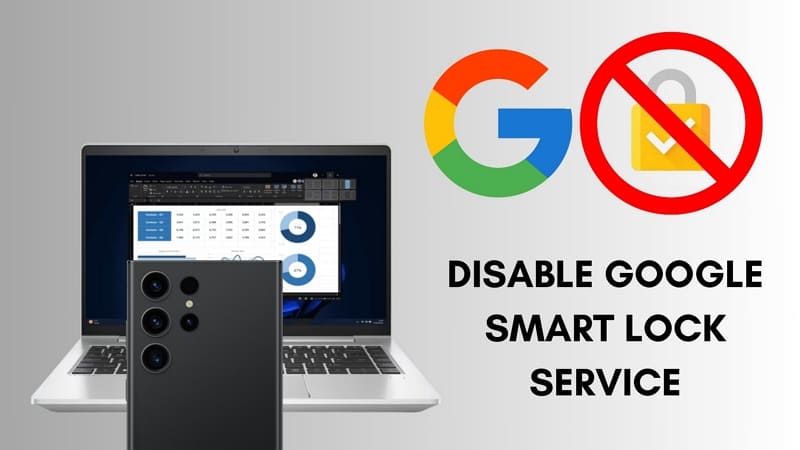
- Part 1. Understanding Google Smart Lock and How It Works?
- Part 2. Recognizing Some Top Features of Google Smart Lock
- Part 3. Why Is It Essential To Remove Google Smart Lock?
- Part 4. 3 Proven Ways to Turn Off Google Smart Lock on Android and Chrome
- Part 5. Forgot Google Smart Lock From Android Device? Recover Using Wondershare Dr.Fone

Part 1. Understanding Google Smart Lock and How It Works?
Want to know what is Google Smart Lock? Google Smart Lock serves as a multi-purpose tool within the Google ecosystem. It is designed to streamline security measures and password management access across platforms. At its core, Google Smart Lock operates as a feature that manages passwords. Google Smart Lock aims to enhance authentication processes. Primarily, it operates across Android devices and computers.
Google Smart Lock streamlines your online security by eliminating the need for multiple passwords. As a trusted password manager, it securely stores login credentials for websites and apps.
Part 2. Recognizing Some Top Features of Google Smart Lock
Google Smart Lock is an integrated Android and Chrome feature that securely manages your passwords and simplifies logins across devices. It helps you access apps and websites effortlessly, while offering flexible options if you ever need to learn how to remove Google Smart Lock for more control over your security preferences.
Key features include:
- Password Autofill: Automatically fills your saved usernames and passwords into apps and websites, saving you from typing them manually.
- Cross-Device Sync: Syncs passwords across any device where you're signed into your Google Account, providing consistent access everywhere.
- Secure Storage: Encrypts and stores your credentials within your Google Account, protected by Google's security infrastructure.
- Password Generation: Suggests strong, unique passwords when you create new accounts to enhance your security.
While these features offer convenience, some limitations or security concerns may lead you to disable it.
Part 3. Why Is It Essential To Remove Google Smart Lock?
Despite its convenience, Google Smart Lock has several drawbacks that lead many users to disable it. Here are the most common reasons:
-
Privacy Concerns A primary concern is that anyone with access to your unlocked device or Chrome browser can view your saved passwords in plain text through the settings. This creates a potential security risk if your device is lost, stolen, or shared.
-
Glitches and Inconsistencies The service can be unreliable. Users often report autofill errors, especially when managing multiple accounts for the same website. These glitches can lead to login failures and syncing issues across devices.
-
It's a Deprecated Feature The "Smart Lock for Passwords" API is officially deprecated, meaning Google no longer actively maintains or updates it. This can result in a lack of new features and, more importantly, a potential for unpatched security vulnerabilities over time.
-
Better Alternatives Exist Dedicated password managers (like 1Password, Dashlane, or Bitwarden) offer more robust features. They often provide superior encryption, secure password sharing, cross-platform apps, and advanced security options that go beyond what Google Smart Lock offers.
Part 4. 3 Proven Ways to Turn Off Google Smart Lock on Android and Chrome
If you want to disable Google Smart Lock on your devices, it is a relatively easy thing to do. Several ways are available to disable or remove Google Smart Lock from devices. These approaches cater to users' diverse needs and preferences. Here is how to turn off Google Smart Lock:
Way 1. How to Disable Google Smart Lock via Chrome Settings on Android
To deactivate Google Smart Lock on your Android device, you can use Chrome. Google Chrome is the main hub for storing all your login credentials for websites and apps. This provides the quickest way to disable Google Smart Lock. To disable Google Smart Lock from the Chrome app on your Android device, follow these steps:
- Step 1. Begin by opening the Google Chrome app on your Android device. Then, tap the “three dots” icon from the top right corner and press "Settings."

- Step 2. Within the Settings, choose "Passwords,” and on the following screen, look for the “Save passwords” and “Auto Sign-in” options. Toggle off both options to disable the Google Smart Lock feature from your Android.

Way 2. How to Remove Smart Lock's "Extend Unlock" Feature
Google Smart Lock's Extend Unlock feature lets you securely bypass repeated password entries under predefined conditions. It provides seamless access when you're in trusted locations—like home or office—or connected to a recognized Bluetooth device, such as a smartwatch or headphones.
As helpful as it is in managing access to your Android device, privacy concerns can cause users to disable this lock. The following are the steps you can take to disable Google Smart Lock/Extend Unlock via Android settings:
- Step 1. Access “Settings” on your Android device and scroll down to tap "Passwords & security." Here, press the option labeled as "Privacy."
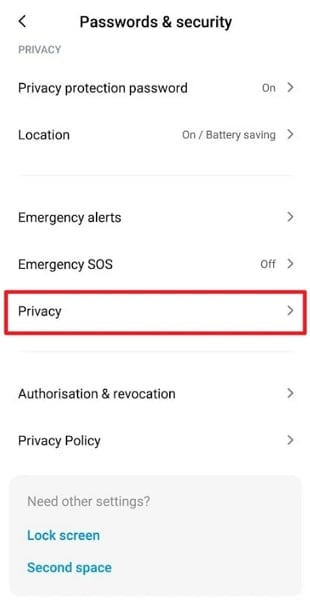
- Step 2. On the following screen, head to the "Trust agents" option and toggle off the "Smart Lock (Google)" option to disable the feature on your device.

Way 3. Disabling Google Smart Lock From Chrome
Google Smart Lock extends beyond Android, seamlessly integrating with Google Chrome to deliver a unified password management experience across all your devices. If you prefer other options, you can easily learn how to remove Google Smart Lock from Chrome and switch to your preferred password manager.
- Step 1. On your computer, access Google Chrome and click the “three dots” near the top right corner. From the context menu, choose "Settings" and tap "Autofill and passwords" from the left side.

- Step 2. Now, click "Google Password Manager" on the ensuing window, and choose "Settings" from the left side. Toggle off "Offer to save passwords" and "Sign in automatically" to disable Google Smart Lock.

Part 5. Forgot Google Smart Lock From Android Device? Recover Using Dr.Fone - Screen Unlock (Android)
Disabling Google Smart Lock may increase the risk of forgetting key passwords, including your Android screen lock, which can lock you out and disrupt everyday tasks like calling, texting, or using apps. This risk underscores the importance of a robust password management solution.
In such instances, regaining access becomes crucial. Wondershare Dr.Fone offers a robust solution in these cases. This software specializes in unlocking Android devices when users forget their device passcodes. It offers a swift solution to eliminate Android lock screens within 5 minutes. If you own a Samsung or LG device, you can unlock it without data loss.
Dr.Fone - Screen Unlock (iOS)
Best for Removing Google Smart Lock
- Supports almost all carriers, from Vodafone to Sprint.
- Move to any network operator within minutes aimlessly without data loss.
- You can unlock an iPhone without an R-SIM.
- Support newly released models from iPhone 5S to iPhone X.
Step-by-Step Guide To Unlock Android Smartphone via Dr.Fone - Screen Unlock (Android)
- Step 1. Unlocking an Android Device Using Wondershare Dr.Fone
Install the latest Wondershare Dr.Fone and connect your Android device via USB. Open the Toolbox menu and select the Screen Unlock tool. Choose the Android option when prompted, then click "Unlock Android Screen" to proceed.
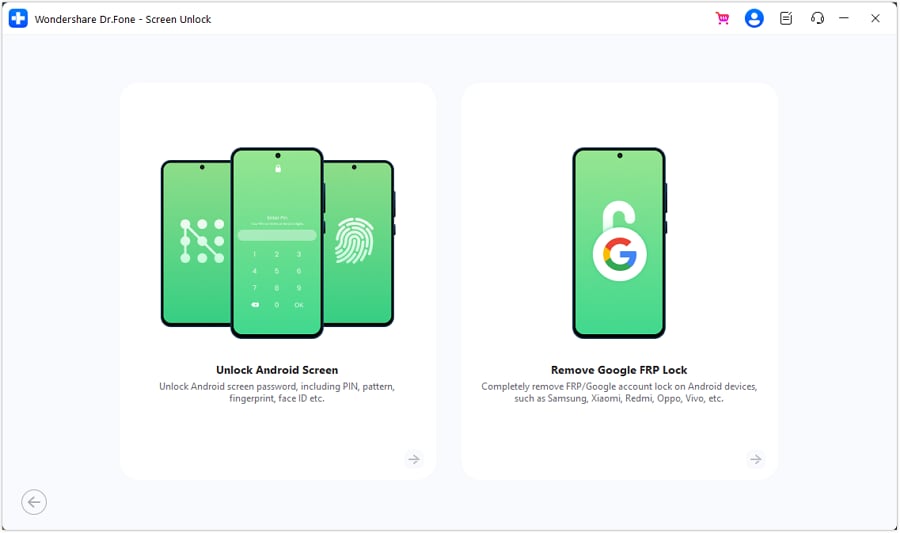
- Step 2. Device Brand Selection and Screen Unlock Initiation
Select your device brand and "100% Remove Screen Lock." Selecting the device brand initiates access to the designated mode. It will trigger Dr.Fone to commence unlocking the Android screen. Note that entering specific modes varies depending on the device brand. Upon successfully unlocking your Android device screen, tap "Done."
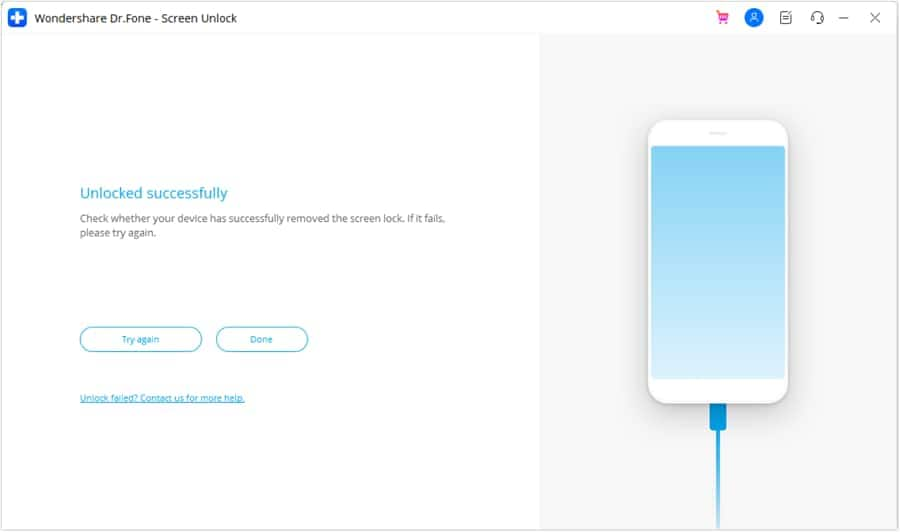
Tips: Forget your device password and can't get access to it? No worries as Dr.Fone is here to help you. Download it and start a seamless unlock experience!
Simplify your smartphone experience with Dr.Fone App, the all-in-one solution for both iOS and Android users. With our app, you can unlock your device, change your GPS location, and transfer WhatsApp data with ease. Additionally, recover lost data from Android devices and transfer files, photos, and music between devices with ease. Check out our "Tips" section for expert advice on getting the most out of Dr.Fone App.
Dr.Fone App (iOS) & Dr.Fone App (Android)
Your One-Stop Expert for Screen Unlock, Smart Clean, Data Recovery, and Phone Management of Mobile Devices!
- Effortlessly unlock various locks on your device.
- Instantly free up storage space by smart clean.
- Rapidly recover different kinds of lost phone data and information.
- Easily manage cluttered and private device content.
- Supports both iOS and Android devices.
Conclusion
This guide highlights the importance of Google Smart Lock by detailing its features and methods to disable it on both Android devices and Chrome. It emphasizes the risks of forgotten passcodes and the need for a reliable recovery solution. Dr.Fone - Screen Unlock (Android) offers a secure way to regain device access when locked out.
Android Unlock
- Android Password Lock
- 1. Reset Lock Screen Password
- 2. Ways to Unlock Android Phone
- 3. Unlock Wi-Fi Networks
- 4. Reset Gmail Password on Android
- 5. Unlock Android Phone Password
- 6. Unlock Android Without Password
- 7. Emergency Call Bypass
- 8. Enable USB Debugging
- 9. Unlock Asus Phone
- 10. Unlock Asus Bootloader
- Android Pattern Lock
- Android Pin/Fingerprint Lock
- 1. Unlock Android Fingerprint Lock
- 2. Recover a Locked Device
- 3. Remove Screen Lock PIN
- 4. Enable or Disable Screen Lock PIN
- 5. Pixel 7 Fingerprint Not Working
- Android Screen Lock
- 1. Android Lock Screen Wallpapers
- 2. Lock Screen Settings
- 3. Customize Lock Screen Widgets
- 4. Apps to Reinvent Your Android
- 5. Lock Screen Wallpaper on Android
- 6. Unlock Android with Broken Screen
- 7. Unlock Google Find My Device Without Problems
- 8. Forgot Voicemail Password on Android
- 9. Unlock SafeSearch on Google
- Android Screen Unlock
- 1. Android Device Manager Unlock
- 2. Unlocking Android Phone Screen
- 3. Bypass Android Face Lock
- 4. Bypass Android Lock Screen
- 5. Bypass Lock Screen By Emergency Call
- 6. Remove Synced Google Account
- 7. Unlock Android without Data Loss
- 8. Unlock Phone without Google Account
- 9. Unlock Android phone
- 10. Reset a Locked Android Phone
- 11. Unlock Doogee Phones
- 12. Best 10 Unlock Apps For Android
- 13. Remove Gmail Account
- 14. Unlock 30/30 Attempts Remaining
- 15. OEM Unlock Missing
- 16. Change Lock Screen Clock
- 17. OEM Unlocking on Android
- 18.Bypass Knox Enrollment Service
- 19. Unlock Google Pixel 6a, 6 or 7
- 20. Best Alternative to MCT Bypass Tool
- 21. Best Way to Unlock Your ZTE Phone
- Android SIM Unlock
- 1. Easily Unlock Android SIM
- 2. 5 Android Unlock Software
- 3. Carrier Unlock Phone to Use SIM
- 4. Change Android Imei without Root
- 5. How to Change SIM PIN on Android
- 6. Best Unlocked Android Phones
- Android Unlock Code
- 1. Lock Apps to Protect Information
- 2. Unlock Secret Features on Phone
- 3. Android SIM Unlock Code Generator
- 4. Ways to Sim Unlock Phone
- 5. Remove Sim Lock without Code
- 6. Updated Android Factory Reset Code
- Google FRP Bypass
- 1. Bypass Google Account Verification
- 2. Bypass Google FRP Lock On Phones
- 3. Bypass Google Pixel FRP
- 4. Huawei Bypass FRP Tools for PC
- 5. Android 16 FRP Bypass for Samsung S25
- 6. Bypass Samsung S24 FRP Lock
- 7. EDL Cable Unlock FRP
- 8. Unlock OnePlus Nord FRP
- 9. OnePlus Nord N100 FRP
- 10. EFRP ME APK FRP Bypass
- 11. RootJunky FRP Bypass
- 12. What to Do When Locked Out of Google Account
- 13. Android Utility Tool
- 14. Remove Google FRP Using Online Tools
- Unlock Bricked Phone
- 1. Restore Bricked Mobile Phone
- 2. Fix Motorola Bricked Phone
- 3. Fix Bricked Redmi Note
- 4. Unbrick Oneplus Easily
- 5. Unbrick Xiaomi Phone
- 6. Unbrick Huawei Phone
- 7. Unbrick Poco X3
- 8. Software to Unbrick Samsung
- 9. Unbrick 3DS
- 10. Unbrick PSP
- Android Unlock Tools
- 1. Griffin Unlocker Tool Review
- 2. BMB Unlock Tool Review
- 3. Android Multi Tools Review
- 4. Best Bootloader Unlock APKs
- 5. Top 5 Micromax FRP Tools
- 6. Pangu FRP Bypass
- 7. Google Account Manager APK FRP Review
- 8. D&G Password Unlocker Review
- 9. Android Multi Tools Review
- 10. Easy Samsung FRP Tool Review
- 11.Samfw FRP Tool
- Android MDM
- ● Manage/transfer/recover data
- ● Unlock screen/activate/FRP lock
- ● Fix most iOS and Android issues
- Unlock Now Unlock Now Unlock Now


















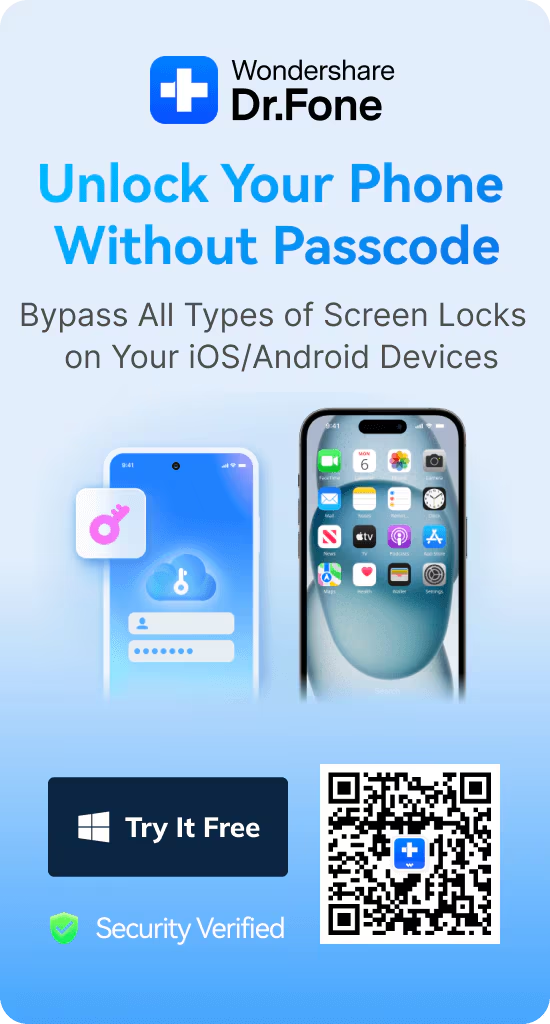

Daisy Raines
staff Editor